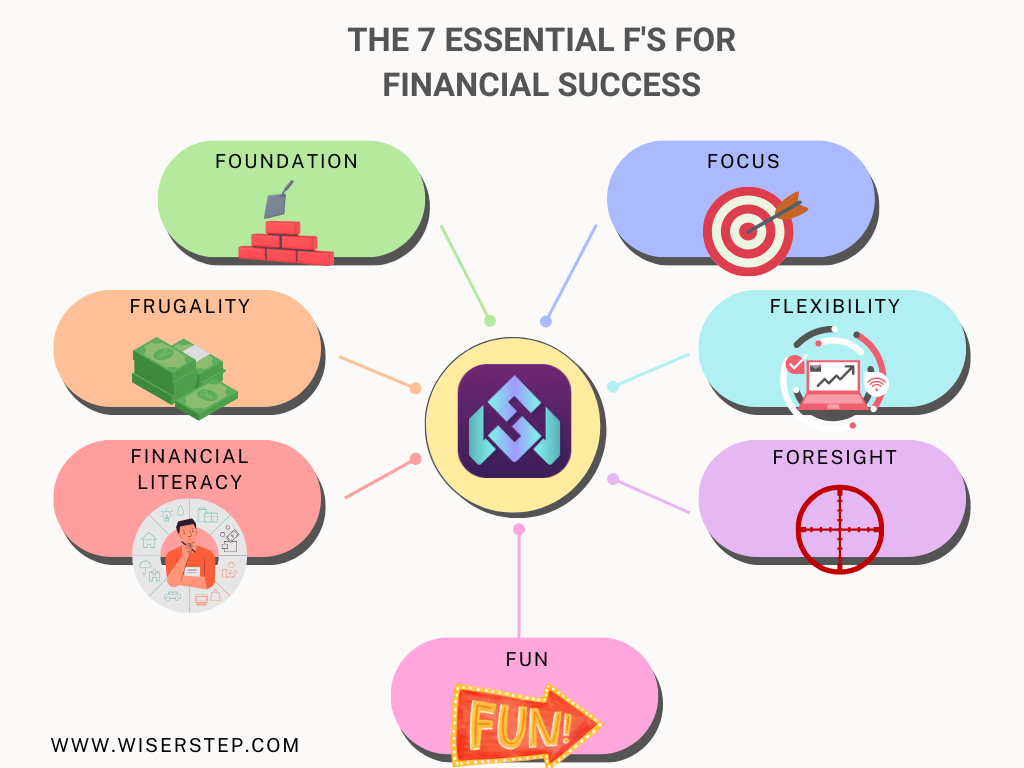In today’s fast-paced and dynamic world, managing finances effectively is crucial for achieving financial success and security. To simplify this complex task, let’s explore the 7 essential ‘F’s for necessary finances that can guide you on the path to economic well-being.
Foundation: Building a Solid Financial Base
The first ‘F’ in the journey to financial success is the foundation. Just as a sturdy building requires a strong foundation, your financial stability begins with a well-constructed plan. Start by setting clear financial goals, including short-term and long-term objectives. Create a budget that outlines your income, expenses, and savings. Establishing an emergency fund is also part of building a robust foundation, providing a safety net for unexpected expenses and ensuring you’re prepared for the unexpected twists life may throw your way.
Frugality: Making Smart Spending Choices
Frugality is the second ‘F’ that plays a pivotal role in achieving financial success. Being frugal doesn’t mean sacrificing your quality of life but rather making informed decisions about your spending. Differentiate between needs and wants, prioritize essential expenses, and cut unnecessary costs. Embracing a frugal mindset allows you to save more, reduce debt, and invest wisely for your future.
Financial Literacy: Empowering Yourself with Knowledge
Financial literacy is the third ‘F’ and is often underestimated in its importance. Understanding the basics of personal finance, including budgeting, investing, and managing debt, is crucial for making informed decisions. Stay updated on financial trends and continuously educate yourself to navigate the ever-changing economic landscape. Take advantage of resources like books, online courses, and reputable financial websites to enhance your financial knowledge.
Focus: Staying Committed to Your Financial Goals
Focus, the fourth ‘F,’ is about maintaining discipline and staying committed to your financial goals. It’s easy to get sidetracked by impulse purchases or short-term desires, but maintaining focus ensures that you stay on course. Regularly review and reassess your financial goals, making adjustments as needed. A focused approach helps you resist unnecessary temptations and paves the way for long-term financial success.
Flexibility: Adapting to Changing Circumstances
Flexibility, the fifth ‘F,’ is about being adaptable in the face of life’s uncertainties. Financial situations can change due to various factors, such as job loss, health issues, or unexpected expenses. Having a flexible financial plan allows you to adjust to these changes without causing major disruptions. Continuously reassess and update your financial strategy to accommodate evolving circumstances and ensure your financial well-being in any situation.
Foresight: Planning for the Future
The sixth ‘F,’ foresight, involves planning for the future and making strategic financial decisions today that will benefit you in the long run. This includes saving for retirement, investing wisely, and considering insurance options to protect against unforeseen events. Foresight also entails thinking about legacy planning and how your financial decisions today can impact future generations. By having a forward-thinking mindset, you can ensure that your financial success is sustained over time.
Fun: Balancing Enjoyment and Financial Responsibility
The final ‘F’ is fun, emphasizing the importance of striking a balance between financial responsibility and enjoying life. While it’s crucial to save and invest for the future, it’s equally important to allocate some resources for leisure and enjoyment. Budgeting for recreational activities or personal interests helps prevent burnout and maintains a healthy relationship with money. Remember that financial success isn’t just about accumulating wealth; it’s about achieving a balance that enhances your overall well-being.
Incorporating these 7 essential ‘F’s into your financial strategy can provide a comprehensive framework for achieving and sustaining financial success. Building a solid foundation, practicing frugality, embracing financial literacy, maintaining focus, being flexible, planning for the future, and allowing room for fun are all integral components of a well-rounded approach to personal finance. By incorporating these principles into your financial journey, you’ll be better equipped to navigate the complexities of today’s financial landscape and secure a prosperous future.

